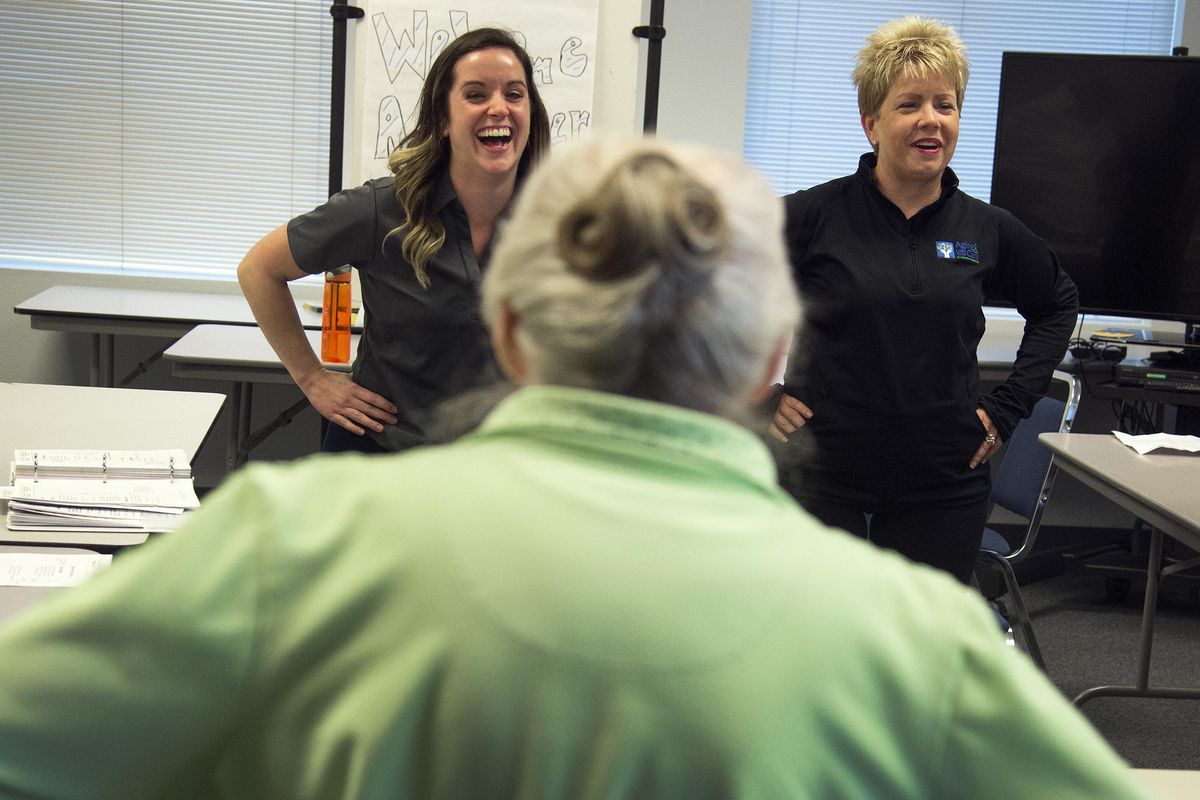Keeping seniors on their toes

Spokane County has a higher death rate from fall-related injuries than the rest of the state.
That’s why Aging and Long Term Care of Eastern Washington is piloting a new eight-week workshop series to reduce the fear of falling. Often people who fear falling limit their activities, which can result in physical weakness and make the risk of falling even greater.
“I think for most of us (falling) is a reality,” said Shirley Birchak, 81, during a recent A Matter of Balance class. “I realized things are not the way they were.”
According to the Spokane Regional Health District, falls are responsible for 78.8 percent of deaths caused by unintentional injury in Spokane County. Between 2009 and 2013, 557 seniors died in fall-related incidents. Across the nation, 1 in 3 adults age 65 and older fall each year, according to the Centers for Disease Control and Prevention.
Instructors Jamie McIntyre and Patricia Robinson of ALTCEW took a two-day course in Seattle in July to become master trainers of the nationally recognized Matter of Balance program, based on research done by the Roybal Center for Enhancement of Late-Life Function at Boston University.
The next session begins Jan. 11, followed by another Feb 3. The free workshops are for people 60 or older who are mobile and able to problem solve, yet are concerned about falling or have a history of falls.
The class isn’t all physical exercise to improve flexibility, balance and strength. It’s also mental training – focusing on group discussion, problem solving and skill building. The exercise portion doesn’t start until the third session, after participants have gained more self-confidence. Eventually the participants lead the exercises, building leadership skills.
Last week, the six participants sat around a table and discussed ways to be more assertive with family and friends – especially with the upcoming holidays. They did a few role playing exercises.
The woman shared stories of feeling pressure not to do certain activities, which with the help of the Matter of Balance class they now feel confident doing.
Mary Ellen Harvey, 80, told about a recent “knock down drag out” with a friend about moving into an assisted living facility where all her meals would be prepared and the cleaning done.
“It’s like you’re against the whole world,” she said. “But you don’t want to be unreasonable. I could end up there next week. But I’ll wait until when the advantages (of moving) are greater than the disadvantages.”
McIntyre reiterated the importance of self-advocating and doing it in a way that you are assertive, not aggressive.
How do these conversations help prevent falling? McIntyre said it’s crucial to empower seniors and revive self-confidence. If seniors feel capable, they are more likely and willing to change habits and take measures to reduce their falls, whether it’s getting out and walking more or getting rid of the throw rug that’s a tripping hazard.
“It’s such a good feeling when we see changes,” Robinson said, noting that the participants in the initial class had such rave reviews the current class is filled mostly with their friends. She said that’s the ultimate vote of confidence.
Matter of Balance programs report that six months after taking the workshops, 97 percent of the participants are more comfortable about talking about their fear of falling and the same percent feel comfortable increasing activity.
During the classes, participants learn falls are controllable and changing behavior and building self-sufficiency lead to the courage to walk in the neighborhood or shop without falling. It also gives them ways to discuss fears of falling and find ways to help make situations safer.
The seniors set goals for increasing activity and identify ways to make changes at home to reduce falls. And of course, they exercise.
Eventually, McIntyre and Robinson hope to train volunteers to lead the classes. That’s the model of Matter of Balance, to encourage lay trainers to help reduce costs and get more people in the community involved.
The health district oversees the Fall Free Coalition, which began through a state grant in 2007. This network of professionals and residents work to reduce falls in the region by collaborating with businesses, organizations and providers that work with senior populations.
Besides providing free fall risk screenings at community events, the coalition has certified more than 200 senior fitness instructors in the Stay Active and Independent for Life and Balance Enhancement Training programs.
“An average of 540 calls are made to 911 in our community each month for assistance due to falls,” said Joel McCullough, a doctor and health officer for the Spokane Regional Health District. “We can change this by bringing greater attention to many preventative measures that can be easily employed to keep our seniors safe.”